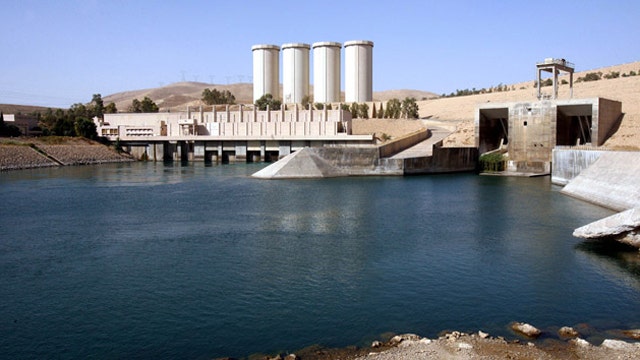ISIS using water as a weapon in Iraq
Militant group taking advantage of drought in Iraq, controlling the waterflow to Baghdad
This is a rush transcript from "On the Record," October 7, 2014. This copy may not be in its final form and may be updated.
GRETA VAN SUSTEREN, FOX NEWS HOST: in Iraq, ISIS is using a new weapon, water. ISIS is viciously cutting off water supplies to villages that dare to resist ISIS rule. That's not all. ISIS also trying to expand its control over Iraq's dams.
Joining us the former U.S. advisor to Iraqi agriculture, John Schnittker. Nice to see you, sir.
JOHN SCHNITTKER, FORMER U.S. ADVISOR TO IRAQI AGRICULTURE: Good evening, Greta.
VAN SUSTEREN: Good evening, sir. So how does is use water as a weapon? How, specifically?
SCHNITTKER: Well, specifically, Iraq is very dependent upon the nearly 100 percent on the flows of the Tigris or the Euphrates River for their drinking water, their irrigation supplies, industrial uses and also power, both hydroelectric power and thermal generation. While ISIS doesn't control the dams currently, they do control diversion points along these rivers that does give them ample opportunities to create problems for Iraq as a country and especially for the localities where they are either diverting or cutting off the flow of water.
VAN SUSTEREN: Now, the Mosul Dam was what we were worried about before that ISIL had taken control of, and now with the U.S. air strikes that has gone back to the Iraqis. But is there something -- since these two rivers, the Euphrates and Tigris flow through the area controlled by ISIS in the northern part of Iraq, is there anything that they can do to that water, to poison it downstream, to Baghdad and other areas?
SCHNITTKER: Right. There's many diversion points along the Tigris before it gets to Baghdad. One in particular, at Samara, where they have the opportunity to divert much of the flow into a major canal and ultimately into a large lake or depression called Tartar where water could be stored. Their storage capacity, they could divert the flow of the Tigris for literally months at a time. So there's very real threats to Iraq's water supply.
VAN SUSTEREN: You know, it's so painful to think that anybody could be that cruel, especially in a country -- I know, in Iraq, in the last few years, it's not had quite the amount of rainfall it has in the past so water is even a great commodity. But it's so incredible that they would do anything to threaten these villages what dare to resist them and threaten their water supply. It's astounding, isn't it?
SCHNITTKER: Well, it is astounding when you think about it, but when you think of the atrocities that is has already committed against individuals across Iraq, I guess it isn't so surprising. But they have certainly, you know, already shown that they will divert water in attempts to cut off water to southern areas in Iraq and also flood agricultural areas in and around Baghdad.
VAN SUSTEREN: John, thank you for joining us.
SCHNITTKER: You're very welcome.






















